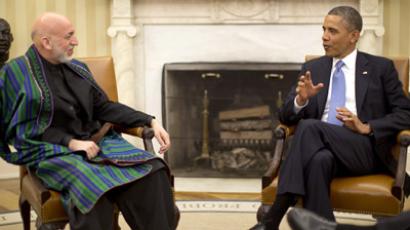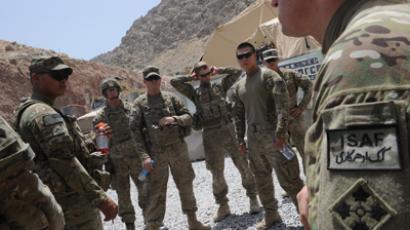‘Categorically false’: US dismisses Karzai’s accusations of Taliban terror collusion
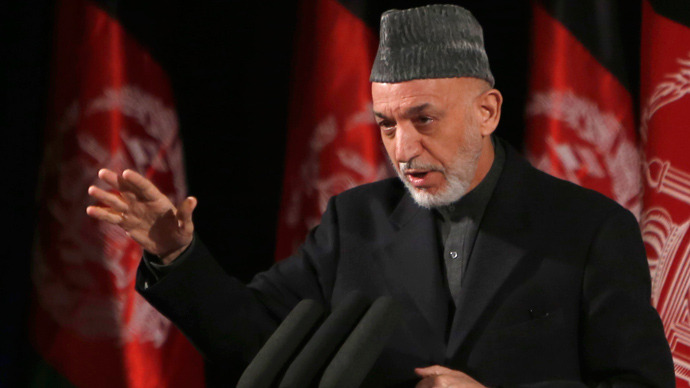
The US has denied that it is collaborating with Islamic terrorists in Afghanistan to prolong the stay of its forces beyond next year, refuting an accusation made by President Hamid Karzai in the wake of a series of suicide bombings.
Two explosions on Saturday killed 19 people in two different
locations, including one in front of the Defense Ministry in the
country's capital Kabul.
"Yesterday's bombings in the name of the Taliban were aimed at serving the foreigners and supporting the presence of the foreigners in Afghanistan and keeping them in Afghanistan by intimidating us," Karzai said in a televised speech, who has been in power since 2001.
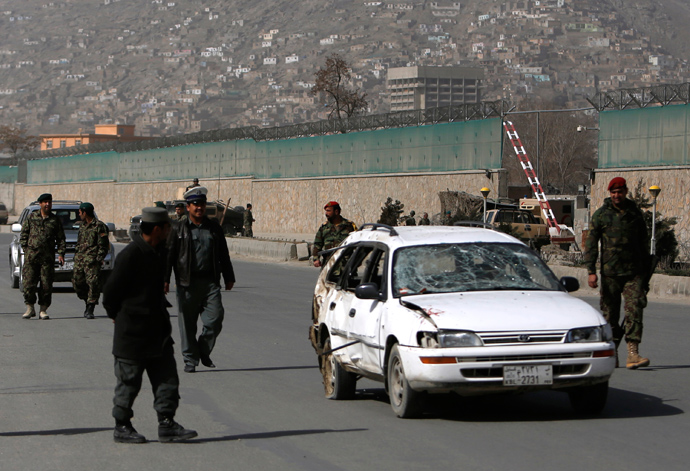
The terrorist acts coincided with Chuck Hagel’s first visit to
Kabul as the US Defense Secretary, in which he was meant to discuss
the gradual reduction of America's presence and the fates of
Afghans held in custody by US forces.
"This attack was a message to him," Taliban spokesman
Zabiullah Mujahid said in the aftermath of the detonations.
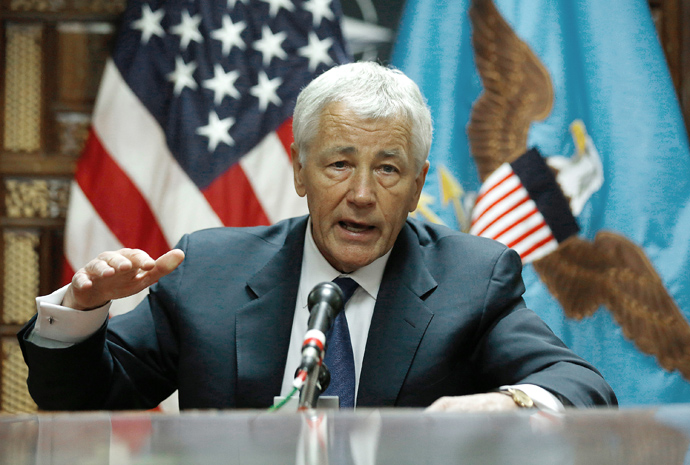
But this is not how Karzai saw the incidents.
"Taliban leaders and representatives are talking with the US
abroad every day," he claimed.
The Taliban, a radical Islamic movement that controls swathes of
the country, refuses to recognize Karzai’s legitimacy.
The Taliban has “strongly rejected” the accusations in an
email communiqué.
The US and NATO forces commander in the country, General Joseph
Dunford, also rebuffed Karzai’s allegations.
``We have fought too hard over the past 12 years, we have
shed too much blood over the last 12 years, to ever think that
violence or instability would be to our advantage,'' Dunford
said.
Meanwhile, the US embassy in Kabul reminded Karzai that it has
not even held talks with radicals following a breakdown in
negotiations exactly a year ago, and insisted that it has “long
supported an Afghan-led process for Afghans to talk to
Afghans”.
Karzai has form of making dramatic anti-American statements –
including referring to NATO troops as “pillaging occupiers”
– whether out of personal frustration, or a desire to portray
himself as a sovereign leader and not an American puppet to his
domestic audience.
Gen Dunford stated that he had never heard Karzai express
similar views to him in private.
The explosions and the fallout appear to have derailed what
already promised to be tumultuous talks between uneasy
allies.
Karzai and Hagel cancelled a joint news conference on Sunday,
although US officials maintained that this was simply a security
precaution, insisting the two men would still meet
one-to-one.
They have a lot to discuss, following a string of apparent disagreements.
The US has just reneged on a promise to hand over Bagram prison,
in the east of the country, which harbors those US intelligence
believes to be some of the most dangerous Taliban
insurgents.

Although no official reason has been given, Karzai proclaimed
last week that “we know there are innocent people in these jails,
and I will order their release, as much as I am criticized for it”,
and the statement appears to have infuriated Washington.
Karzai also recently admonished NATO forces for a raft of
alleged wrongdoings.
He has demanded that US troops move out of the region of Wardak,
which borders Kabul, after alleged incidents of torture and
extrajudicial killings by US troops, which have been strenuously
denied by the Pentagon.
He also accused the US of directing CIA-trained local
operatives, to kidnap an Afghan student, before releasing him at
the Afghan President’s insistence. The US says that it has neither
captured nor released anyone.
The points of contention come amid a US withdrawal from the
mountainous country, after more than a decade at war.
There are currently about 66,000 US troops in Afghanistan, but
that number will be halved next year. It is not clear how many will
remain beyond that time.
``We will tell the NATO where we need them, and under which
conditions. They must respect our laws. They must respect the
national sovereignty of our country and must respect all our
customs,'' Karzai declared on Sunday.
The US has poured billions of dollars into training local
police, army and security forces, to ensure that order does not
collapse as soon as its ground forces leave. But the initiatives
have met with local resistance (with recruits frequently shooting
their NATO mentors) and suspicion from Karzai, who says the new
organizations are opaque and are not under full command of his
government.













